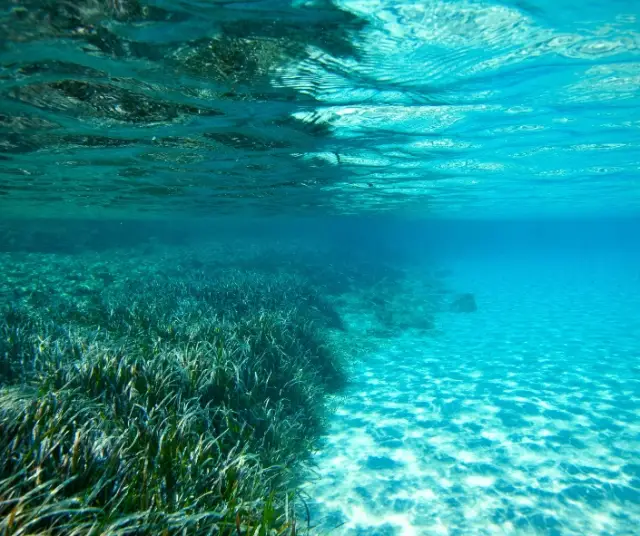Seagrasses, those intricate underwater ecosystems, often go unnoticed in the world of conservation and the environment. However, its role in the health of the oceans and the sustainability of life on Earth is of impressive magnitude. To raise awareness about their importance and promote their preservation, World Seagrass Day was established.
What are Seagrasses?
Seagrasses are marine plants, not terrestrial herbs, found in shallow waters around the world. They are often confused with algae, but they are higher flowering plants that have adapted their structures to survive in a marine environment. They are mainly made up of three genera: Zostera, Posidonia and Halophila, each adapted to different marine conditions and regions.
Most seagrass species thrive in calm water areas, such as bays, estuaries and coastal lagoons, where sunlight can reach the seabed. As they grow, they form dense underwater meadows that provide a unique habitat for a variety of marine life.
The Importance of Seagrasses
Seagrasses are ecological treasures that play a critical role in the health of the oceans and the well-being of the planet. Below are some of the reasons why these underwater ecosystems are so essential:
Crucial Habitat: Seagrasses act as nurseries for numerous species of fish and other marine organisms. These grasslands provide shelter, food and a safe environment for young to develop, contributing to biodiversity and sustainable fisheries.
Carbon Storage: Seagrasses are extraordinary at capturing and storing carbon. Despite occupying less than 0.2% of the ocean area, they are believed to store approximately 10% of the carbon buried in the oceans. This helps mitigate climate change by reducing the concentration of carbon dioxide in the atmosphere.
Improved Water Quality: They filter and purify water by absorbing excess nutrients, which reduces the proliferation of harmful algae and maintains a balance in marine ecosystems.
Coastal Protection: Seagrasses play an important role in protecting coastlines from erosion and flooding by reducing wave force and stabilizing coastal substrate.
Tourism and Recreation: Seagrasses attract tourists, divers and nature lovers, contributing to local economies through sustainable tourism.
Challenges Facing Seagrasses
Despite their importance, seagrasses are threatened throughout the world. The challenges they face include:
Pollution: Pollution of coastal waters, caused by runoff of nutrients and agricultural chemicals, can harm seagrasses by promoting excessive algae growth and damaging plants.
Dredging and Coastal Development: The construction of ports, canals and coastal development projects often involves the destruction or alteration of seagrass habitats.
Destructive Fishing : Trawling and irresponsible boating can directly damage seagrasses.
Climate Change: Rising water temperatures and ocean acidification threaten the survival of seagrasses.
Extraction of Marine Plants: In some regions, the harvesting of seagrasses for use in horticulture or decoration has led to the decline of these ecosystems.
World Seagrass Day
World Seagrass Day is celebrated on March 1 every year. This global event aims to raise awareness of the importance of seagrasses and encourage the conservation of these valuable ecosystems. During this day, a variety of educational and conservation activities take place around the world. Some ways to get involved in World Seagrass Day include:
- Beach and Coastal Cleanup Events: Organize or participate in beach and coastline cleanup events to remove trash that threatens seagrasses.
- Underwater Reforestation Activities: In some areas, seagrass restoration programs are carried out that involve planting seedlings to revitalize ecosystems.
- Educational Talks and Workshops : Participate in talks, workshops and conferences about the importance of seagrasses and how to protect them.
- Donations and Volunteering: Contribute to marine conservation organizations or participate as a volunteer in seagrass-related projects.
- Social Media Promotion: Share information about seagrasses and their conservation on social media to increase public awareness.
Long-Term Conservation of Seagrasses
While World Seagrass Day provides an important opportunity to raise awareness, conservation of these ecosystems must be an ongoing effort. Here are some ways we can contribute to the long-term preservation of seagrasses:
Support Protection Policies: Urge local and national governments to implement policies for the protection and sustainable management of seagrasses.
Pollution Reduction: Take steps to reduce pollution of coastal waters, such as reducing the use of fertilizers and chemicals in agriculture.
Sustainable Fishing: Promote sustainable fishing practices and the use of fishing methods that minimize damage to seagrasses.
Habitat Restoration: Participate in seagrass restoration projects by planting seedlings and removing invasive species.
Continuing Education: Continue learning about seagrasses and share that knowledge with others to foster public awareness.
World Seagrass Day gives us the opportunity to learn, get involved and contribute to their conservation. By taking steps to protect these ecosystems, we are working to preserve biodiversity, mitigate climate change, and ensure a sustainable future for generations to come. Each of us has a role to play in this crucial cause, and World Seagrass Day is a reminder of our shared responsibility to care for our planet's underwater guardians.
